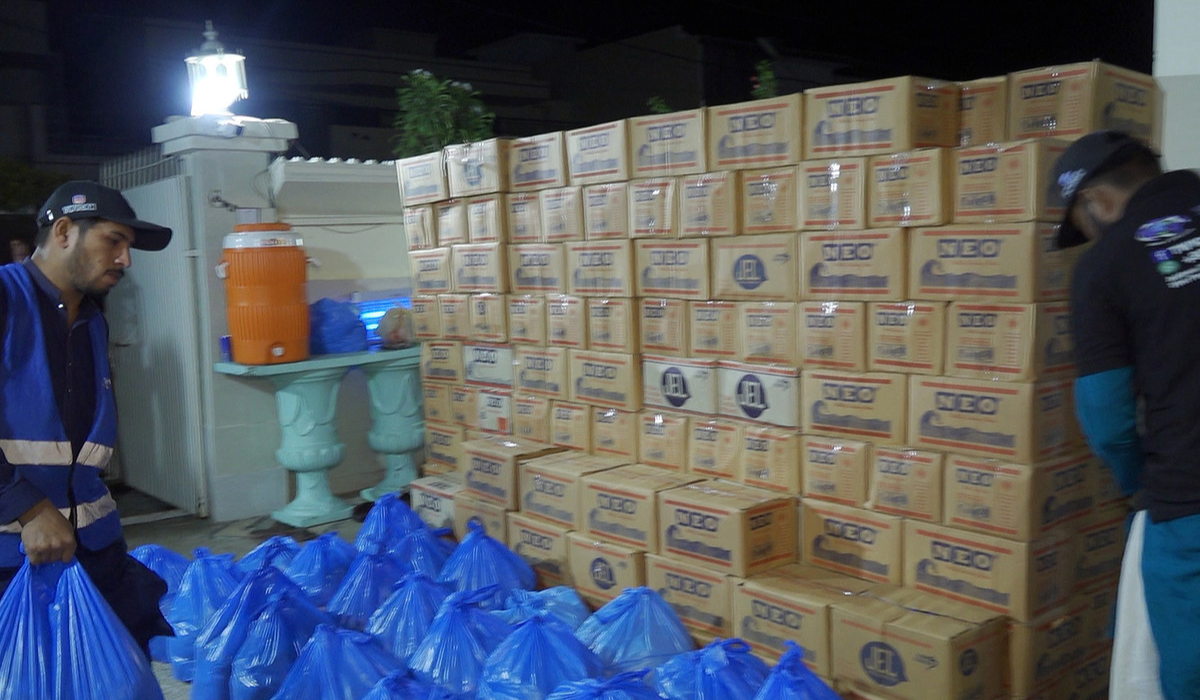KARACHI: With a team of over 80 volunteers, the Together We Can charity in Karachi is pulling off the impressive feat of delivering free sahoor meals to at least 20,000 people daily in this southern Pakistani city, with generous donations and support from family and friends, the founder of the organization said.
The TWC, a registered charity, was set up in 2020 as a ration drive by a group of friends from Pakistan and Dubai to help the needy at a time when income streams had dried up due to the COVID-19 pandemic.
Besides the delivery of free food, the TWC has also set up 380 water pumps, over 30 solar-powered water tanks, and built 12 mosques in the impoverished Thar desert region in Sindh. The organization also provides medical assistance in far-flung areas of the province.
“TWC’s Ramadan journey started in 2020. People mostly focus on (providing) iftar meals and no one focuses on sahoor,” the charity’s president, Nurain Sheikh, told Arab News.
When it started, the initiative prepared 200 packets for distribution at sahoor.
“By the end of the first 30 days, (the number) went up to 5,000. The next year, we started with 5,000 only, and it ended at around 16,000 (to) 17,000 people. Now, as you see, we start with 20,000 only and it goes up to 35,000 (to) 38,000 (by the end of Ramadan). Last year, we roughly closed at 35,000.”
FASTFACTS
• Together We Can, a registered charity, was founded in 2020 as a ration drive by friends from Pakistan and Dubai.
• Initiative started out by preparing 200 packets for distribution at sahoor and it now goes up to 35,000 daily.
The number of food packets delivered depends on both demand and how many vans can be arranged to collect and drop off the meals in different neighborhoods of Karachi, Sheikh said. There is a focus on poor areas including Ibrahim Hyderi and Machar Colony.
“The areas have been chosen based on the circumstances of people residing there,” Sheikh said.
“Our own staff and other people we know tell us about the conditions they live in. Believe me, there is an area where when we distributed burgers or bun kabab, the children said, ‘What is this? Is this something to eat? We haven’t seen a burger before.’”

Volunteers of ‘Together We Can’ charity prepare suhoor meals in Karachi. (AN photo)
The charity drive is made possible by a network of friends, family and loyal staff.
“All of this work is done by our staff, their relatives, and the house help of our friends and families. All of our donors are also friends and family, friends of friends and friends of family,” Sheikh said.
Eighty volunteers, who form the backbone of the service, start working at 8 p.m. to prepare and pack the meals, and end at 4 a.m. which is around the time for morning Fajr prayers.
Though the volunteers are not paid for their work, Sheikh said they are rewarded daily “with a lavish dinner or some token of love and appreciation.”
The menu for sahoor includes biryani rice, water, fruit juices and bun kebab sandwiches, which comprise a shallow-fried spicy patty called shami kebab, omelet, onions and chutney served inside a bun.
“Every parcel has either water or juice, with compulsory nimco and either biryani or a bun kabab,” Sheikh said.
He said around 830 cartons of juice or water, with 24 bottles in each, are distributed daily.
“For biryani, around 75 kg of rice make 1,000 packets. A total of 1,500 kg of rice is used every day to make 20,000 packets of 300 grams each. In addition, we make 5,000 bun kebabs.”
Volunteers who have been working with the charity since its launch said the quantity of packs distributed has increased over the years.
“Earlier, the quantity for sahoor packs was small but it kept increasing with each year,” 30-year-old volunteer Mohammad Usman said.
“Now the setup has become huge. We really enjoy doing it. We distribute as well, we pack (it) and we don’t take any salary for this.”
“When I come back from my Taraweeh prayers, I come here and make bun kababs,” said Shahnaz Danial, a middle-aged community worker.
“Then we go to distribute them. I usually go to Civil Hospital or Jinnah Hospital where the people are quite poor … when I went to Civil (hospital) I was shocked to see that all the people were sleeping on the floor or footpath.”
























